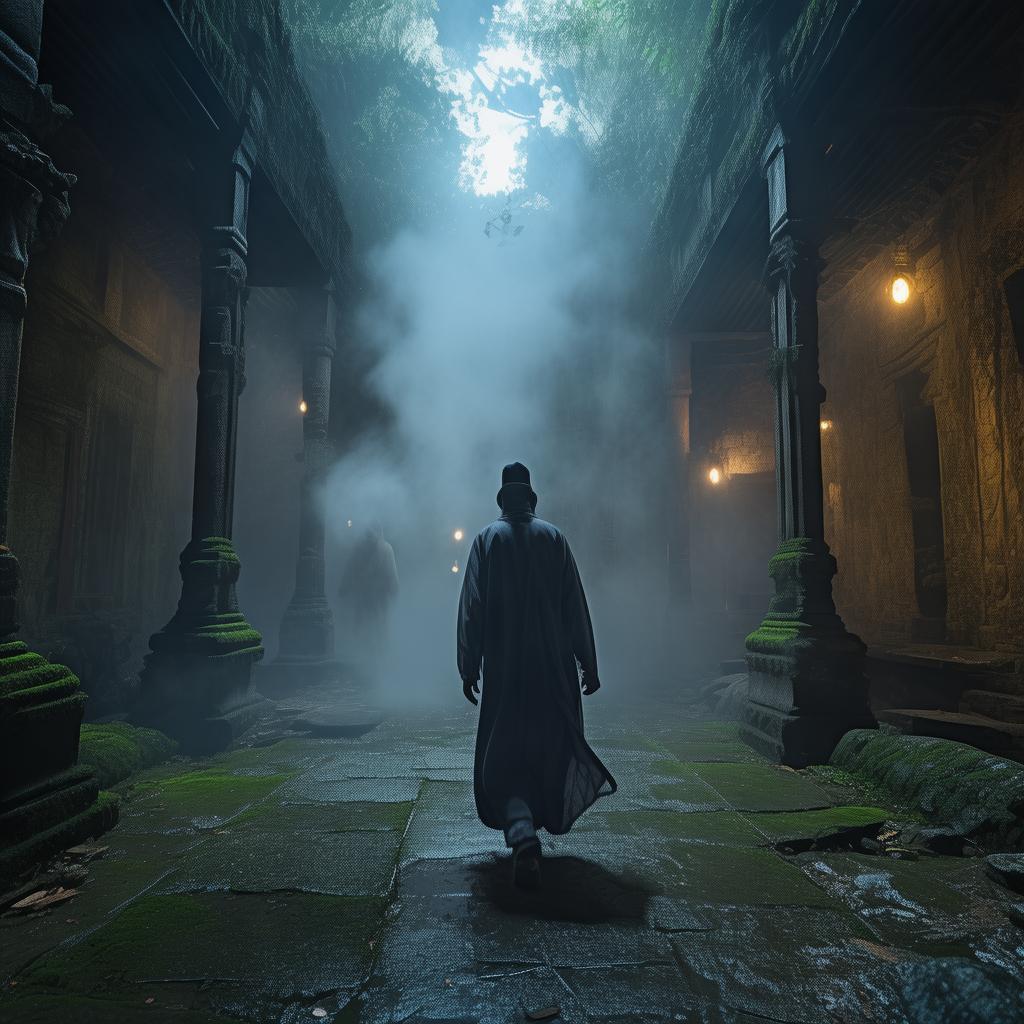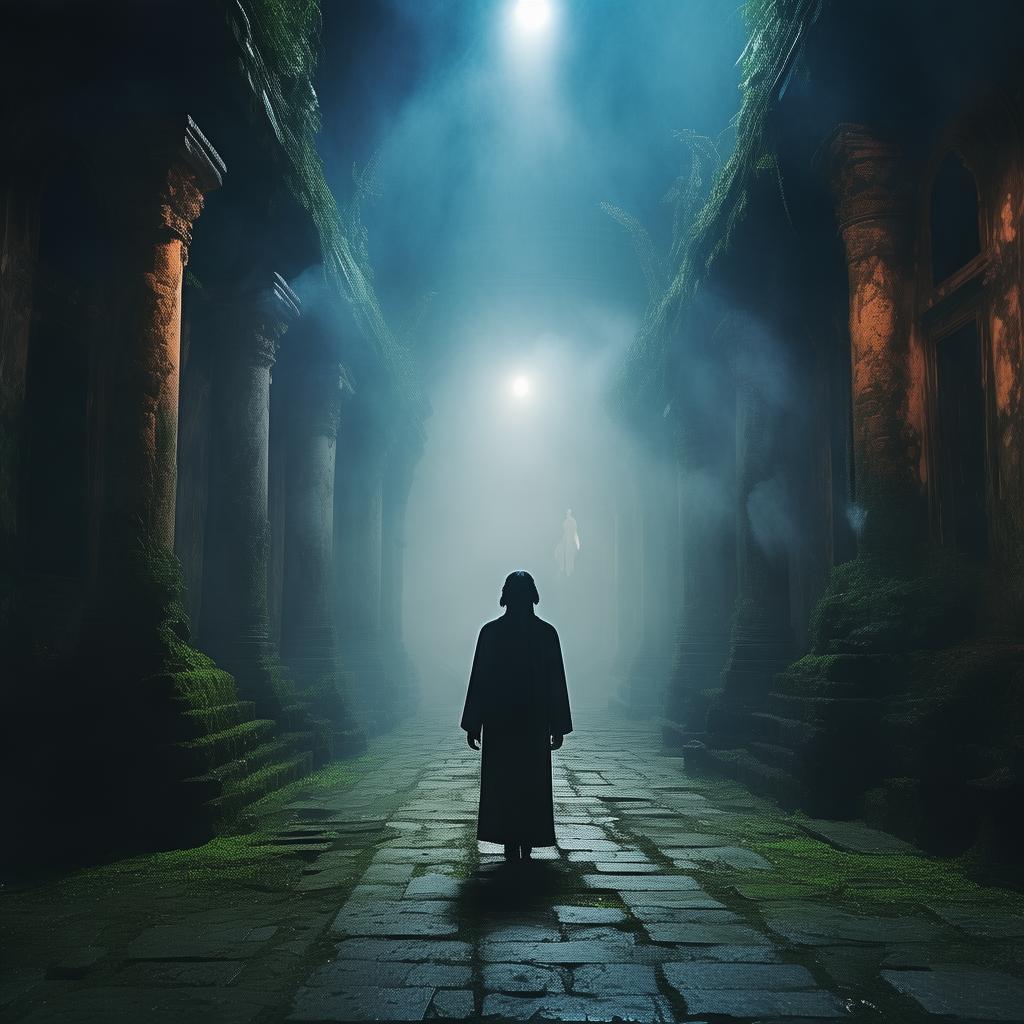The Haunting Symphony: A Requiem for the Unseen
The sun dipped below the horizon, casting a twilight glow over the cobblestone streets of an old, forgotten town. The air was thick with the scent of damp earth and the distant echo of a forgotten lighthouse. Inside the dilapidated town hall, a lone figure sat at a grand piano, the fingers of his right hand dancing across the keys while his left hand turned the pages of a sheet of music.
Dr. Leo Voss, a reclusive composer known for his hauntingly beautiful symphonies, had spent years crafting music that seemed to speak to the unseen world. Now, as he played a piece he had been working on for months, a chill ran down his spine. The music, which he had always believed to be a testament to the beauty of the afterlife, had taken on a life of its own.
The notes seemed to carry a weight, pressing down on the town hall's walls, and as Leo played, the air around him grew thick with a strange, almost tangible presence. He closed his eyes, feeling the music as much as he heard it, and suddenly, the room was filled with whispers.
"I am here," a voice echoed through the hall, and Leo's heart leapt into his throat. He opened his eyes to find a ghostly figure floating before him, its eyes glowing with a cold, otherworldly light.
"This is your symphony," the figure continued, its voice like the rustle of wind through dry leaves. "You have given us a place to rest, a space where we can feel at peace."
Leo tried to speak, but his voice was a mere whisper, swallowed by the room's eerie silence. He had always known his music had power, but he had never imagined it would reach beyond the living. Now, it seemed that his compositions had become a bridge to the afterlife, a requiem for the unseen.
Days turned into weeks, and Leo's music became more than just a form of art; it was a lifeline for the spirits that haunted his town. The music brought them solace, a reminder of what they had once been. But with that solace came a price, for as the spirits found comfort in the music, they also began to demand more from Leo.
One night, as he played, a figure appeared, a woman with long, flowing hair and a face etched with sorrow. "Leo, we need you," she said, her voice a haunting melody. "We need your help to find peace."
Leo's curiosity was piqued, but his heart sank at the thought of what the spirits might ask of him. He knew that once he stepped into this world, there would be no turning back.
The next morning, he received a letter. It was from a local historian, detailing the town's dark past, a time when it had been a place of great turmoil and tragedy. The historian had uncovered a secret about the town, one that connected the spirits to a tragic love story that had unfolded centuries ago.
Leo delved deeper into the town's history, uncovering tales of a young couple whose love had been forbidden, their souls bound to the town by a curse. As he learned more, he realized that his music had become a part of that curse, a requiem that would never end unless he could break it.
Determined to help the spirits find peace, Leo began to weave elements of the town's history into his music, creating a symphony that would tell their story and, in doing so, release them from their eternal imprisonment. The music grew more complex, more powerful, and as Leo played, the spirits seemed to respond.

But as the symphony reached its climax, a new challenge arose. A spirit of great power, the town's founder, emerged, demanding to be heard. Leo's music was too weak to overcome this new obstacle, and the spirits began to falter.
Faced with the possibility of failing the spirits, Leo reached deep within himself, drawing on the emotion and passion that had always driven his compositions. He played with a newfound urgency, his fingers flying over the keys, his heart pounding in his chest.
As the final note echoed through the town hall, the spirits began to disperse, their forms fading into the ether. The founder's spirit, however, remained, its eyes still burning with a fierce determination.
"You have not won," the founder's voice rumbled through the room. "Your music may have freed some, but it has bound me even tighter."
Leo's heart sank, but he refused to give up. "Then I will write a new symphony, one that will challenge even your strength."
With that, Leo began to compose, his mind racing with ideas and emotions. He played for hours, his fingers bleeding from the strain, but he did not stop. He played until the sun rose, until the town awoke, and until the founder's spirit was forced to retreat.
When he finally stopped playing, the town hall was filled with a sense of relief and victory. The spirits had been freed, and Leo's music had become a symbol of hope and healing. But the true test of his music's power would come in the days to follow.
As the weeks passed, the town began to change. The air seemed lighter, the smiles on the faces of the townspeople brighter. Leo's music had not only freed the spirits but had also brought peace to the living.
And so, in the heart of the old town, a new legend was born. The story of Dr. Leo Voss, the composer whose music had become a requiem for the unseen, a symphony that had the power to heal the wounds of the past and bring peace to those who had suffered.
In the end, Leo's music had proven to be more than just a form of art; it was a testament to the enduring power of love, hope, and the human spirit.
✨ Original Statement ✨
All articles published on this website (including but not limited to text, images, videos, and other content) are original or authorized for reposting and are protected by relevant laws. Without the explicit written permission of this website, no individual or organization may copy, modify, repost, or use the content for commercial purposes.
If you need to quote or cooperate, please contact this site for authorization. We reserve the right to pursue legal responsibility for any unauthorized use.
Hereby declared.









